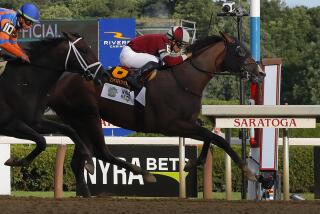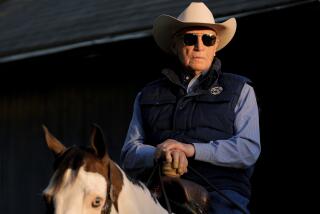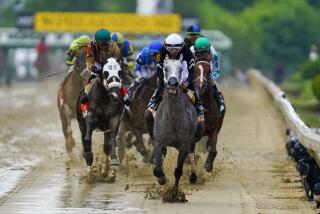Laurin’s Handling of Secretariat Could Be a Guide for Drysdale
Bold Ruler, perhaps the best sire this country has ever produced, died of cancer at Claiborne Farm in Paris, Ky., in 1971, the year before his greatest legacy, Secretariat, ran his first race.
Last year, also at Claiborne, another preeminent stallion, Mr. Prospector, died of stomach trouble complicated by advanced age, his future Kentucky Derby winner, Fusaichi Pegasus, about five months away from a racing debut.
Secretariat, dead for 11 years now, and Fusaichi Pegasus continue to cross historical paths. They were both sold--or syndicated--for breeding purposes before closing out their racing careers, and wouldn’t Lucien Laurin have been able to impart something to Neil Drysdale about that.
Laurin almost lasted long enough to play father confessor. Secretariat’s fretful trainer, who was 88, died Monday, not long after Fusao Sekiguchi had sold Fusaichi Pegasus’ stallion career to Coolmore Stud for an estimated $70 million.
Drysdale has been saying all year that after successfully training a $2.1-million yearling, A.P. Indy, in 1991-92, the jump to Fusaichi Pegasus, the $4-million yearling, wouldn’t bring any bells and whistles. Now, however, he is training a $70-million future stud, and that is a quantum leap, in money as well as perspective.
Sekiguchi, who probably has already converted the Irish-based Coolmore’s punts into yen, chose to walk away from the colt’s breeding potential, but a win in November in the Breeders’ Cup Classic at Churchill Downs would be the coda. It would clinch the horse-of-the-year title, for one thing.
By contrast, Coolmore’s John Magnier wouldn’t want to see Fusaichi Pegasus’ racing commitments jeopardize his breeding investment. Magnier is on quite a large hook for $70 million, or whatever the exact figure is, and optimistically, even working Fusaichi Pegasus in the breeding shed like a sultan in a harem, his recoup time is three or four years.
Can Drysdale hold hands with these cross-purposed horsemen for a few more months? Of all the trainers, he’s best-suited to pull it off. For starters, he doesn’t over-race his stock as a matter of course.
Even before Magnier and Sekiguchi made their deal, Fusaichi Pegasus was being handled like a cheese souffle. He raced only twice as a 2-year-old, and this year his races were kept a month apart until the Triple Crown series loomed, requiring Drysdale to stray from his style.
Then, after the second-place finish behind Red Bullet in the Preakness, Drysdale skipped the Belmont Stakes, last of the Triple Crown, because of a foot injury that has required no special treatment since Fusaichi Pegasus was shipped back to California.
Compared to Laurin, Drysdale’s stint with his lame-duck overachiever should be a Sunday stroll.
In February of 1973, a month after the death of Christopher Chenery, the utilities magnate and owner of a sprawling Virginia farm, Laurin took on 29 partners--the 28 syndicate members and Penny Chenery, one of the heirs, who managed the four shares that her family retained in Secretariat.
The tax burden from her father’s estate forced Penny Chenery to prematurely sell the future stallion, and--just as it has come to pass with Fusaichi Pegasus--deprive the hungry racing industry of another year of on-track excellence from a magnificent horse.
The Secretariat breeding syndication was for $6.08 million, a record at the time. Each share cost $190,000--think about it, Fusaichi Pegasus’ opening stud fee will be more than that--and Laurin suddenly was surrounded by a bunch of plutocrats not accustomed to a democratic approach. Their ranks included Paul Mellon, Howard Keck, Ogden Phipps, W.L. McKnight and one of the du Ponts.
Laurin had enough of a track record that he shouldn’t have milquetoasted before Megalomania Inc. He had trained Quill, the best 2-year-old filly in 1958, and in 1966 he won the Belmont Stakes with Amberoid, costing Kauai King the Triple Crown. In 1972, before Secretariat began racking all those victories as a 2-year-old, Laurin won the Derby and the Belmont with Riva Ridge, one of the first horses he ever trained for the Chenerys.
But Laurin, a tiny, insecure French-Canadian, had taken on the Chenery job in 1971 with no real vote of confidence, and he knew it. Roger Laurin, his 34-year-old son, had been the private trainer for Christopher Chenery’s Meadow Stable, and when the younger Laurin left, to train for the Phipps family, the recommendation of his father as his successor was accepted with reservations.
So into this mix in early 1973 strode Secretariat, the most expensive stallion prospect ever. As a 2-year-old, he had already won a horse-of-the-year title. The Triple Crown would have been a land mine for Laurin, apart from the syndicate pressures.
The pitiable Laurin inadvertently added to his woes by running a horse owned by a fellow Canadian, Edwin Whittaker, in the Wood Memorial, two weeks before the Derby. Angle Light beat Secretariat that day, after a stretch run that got away from Laurin, his box-seat view at Aqueduct blocked by others in the area.
“Who won?” Laurin asked Penny Chenery just as the horses crossed the finish line.
“You did,” Chenery disgustedly sputtered, “but with the wrong horse!”
Those were 14 long days after the Wood. Chenery didn’t want the overwrought Laurin to run Whittaker’s Angle Light back in the Derby. Some of the syndicate members didn’t even want Laurin to run Secretariat in the Derby. Progeny of Bold Ruler were suspect at 1 1/4 miles, and the combine already owned a horse of the year. They could envision the colt’s stud fee shrinking with each defeat.
If Angle Light had beaten Secretariat again in the Derby--he finished 10th--the winning trainer would have needed a bullet-proof vest.
Laurin got through that day, and there was another big win by Secretariat in the Preakness. He didn’t let on going into the Belmont, but Laurin was extremely confident. He told friends that he thought Secretariat was 10 lengths better than the field. Then a few nights before the race, he woke up in a cold sweat. He had dreamed that Secretariat stumbled in the race, throwing jockey Ron Turcotte to the ground.
Secretariat, of course, was 31 lengths better. But when he got off to that big lead, running the first six furlongs in a blinding 1:09 4/5, the nightmare came back to Laurin as he again stood near Penny Chenery in the boxes. He could think of only one thing to say, and he said it over and over.
“Don’t fall off, Ronnie.”
Horse Racing Notes
With Pat Day riding Cat Thief in the $1-million Sempra Energy Hollywood Gold Cup on July 9, Brice Blanc has picked up the mount on Commendable, the Belmont Stakes winner, in the Dwyer Stakes the same day at Belmont Park. . . . Pleasant Breeze was flown from New York to California on Thursday, to run in the Gold Cup.
More to Read
Go beyond the scoreboard
Get the latest on L.A.'s teams in the daily Sports Report newsletter.
You may occasionally receive promotional content from the Los Angeles Times.










